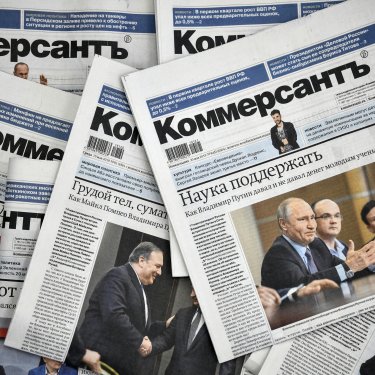Terrible blow to what is left of Russian editorial independence

Reporters Without Borders (RSF) is dismayed by the latest blow to editorial independence in Russia, in which two journalists at the leading Moscow business daily Kommersant were fired, 11 of their colleagues resigned in protest and then more than 200 of the newspaper’s journalists issued a joint warning that its readers would now be denied unbiased coverage.
Читать на русском / Read in Russian
Yesterday’s turmoil at the newspaper began when it was confirmed that two of its journalists had been fired over an article about a Kremlin ally, and 11 of their colleagues in the newspaper’s politics section then resigned en masse in solidarity. Reporters Maxim Ivanov and Ivan Safronov were dismissed for reporting that Valentina Matviyenko, an influential politician allied to Russian President Vladimir Putin, could be replaced as speaker of the Federation Council (the Russian parliament’s upper house) in the coming months.
“I am leaving the Kommersant publishing group not of my own volition but as a result of a decision by the shareholder, who was extremely critical of the article about Federation Council speaker Valentina Matviyenko’s possible resignation,” Safronov wrote in a Facebook post.
A spokesperson for the newspaper’s owner, influential billionaire businessman Alisher Usmanov, said Usmanov did not take “decisions on the firing or hiring of journalists.” But the information gathered by RSF confirms that Ivanov and Safronov were indeed fired as a result of pressure from Usmanov, who was critical, inter alia, of the fact that they did not name their sources for the story.
Yesterday evening, more than 200 Kommersant journalists posted a joint letter on Facebook confirming the owner’ interference and emphasizing the professionalism of their two dismissed colleagues and the importance of the confidentiality of journalists’ sources.
The joint letter added: “Our readers, partners and advertisers will be deprived of high-quality and unbiased coverage of a number of domestic political issues (...) for a long time now.”
“This editorial meddling in the Kommersant newsroom by the owner is a terrible blow to what is left of journalistic independence in Russia,” RSF’s Eastern Europe and Central Asia desk said. “Respect for the confidentiality of journalists’ sources is an essential principle for which there is provision in Russian law. Reporters Without Borders would also like to express its total solidarity with journalists who mobilize to defend independent, quality journalism, which is threatened by increasingly blatant political interference.”
The Journalists’ and Media Workers’ Union issued a call for a strike, saying it was “deeply concerned by the situation” and condemning what it called a “brutal interference by shareholders in editorial policy.” The Russian Union of Journalists, too, pointed out that “shareholder meddling in editorial policy violates the constitutional right to free speech.”
Kommersant was once regarded as the flagship of the Russian press but its prestige has declined steadily since 2008, when Usmanov bought the company that publishes it. After two editors were fired in late 2011 for publishing comments that supposedly insulted then Prime Minister Vladimir Putin, 35 Kommersant journalists signed an open letter accusing Usmanov of trying to “intimidate” them.
When Maria Karpenko was fired as its Saint Petersburg correspondent in March of this year, Kommersant said it was because her comments on the Telegram social network had “violated the newspaper’s editorial policy.” But Karpenko said she was convinced that the real reason for her dismissal was her critical coverage of Saint Petersburg acting governor Aleksandr Beglov during his election campaign.
Russia is ranked 149th out of 180 countries in RSF’s 2019 World Press Freedom Index.



